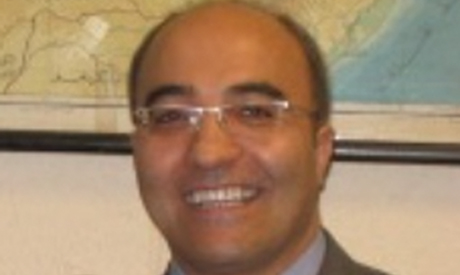Turkish historian M Hakan Yavuz, the author of a new book on Turkish Neo-Ottomanism, explains the politics of Turkish nostalgia for the former Ottoman Empire
In his new book entitled “Nostalgia for the Empire: The Politics of Neo-Ottomanism” published by Oxford University Press in the UK in August, political science professor at the University of Utah in the US M Hakan Yavuz argues that Turkey’s ruling Justice and Development Party (AKP), representing the country’s political and economic elite, seeks to “enhance the state more than society” and believes that “strengthening economic and social circumstances will be necessary to empower the state.”

He says that this is related to an “emotional, nostalgic identity” that has grown up in Turkey that he describes as “neo-Ottomanism”. This is dedicated to “rooting present notions of Turkish national identity within their Ottoman Islamic heritage” and bringing about a “deeper and renewed cultural and economic engagement with territories and societies once ruled by the Ottoman state and an attendant desire to renew leadership of the Muslim world to fend off ongoing destructive Western and Russian invasions and imperialism in the region,” Yavuz says.

Neo-Ottomanism involves a connection between identity and national pride, Yavuz explains, adding that contemporary Turkey largely “feels at home only in its imperial Ottoman past” and linking this to many present and historical factors. These include Turkey’s failure to join the European Union and the religious and national diversity of the former Ottoman Empire that is not seen in current Turkish society.
Speaking to Al-Ahram Weekly, Yavuz explained in particular many of Turkey’s diplomatic and military actions in different parts of the world, including Asia, the Middle East and Europe.
The AKP has won almost all the electoral races in Turkey since the early 2000s. Does this imply that Turkish society accepts its vision of state and society?
Although Turkish President Recep Tayyip Erdogan comes from a marginalised socio-economic background, he initially campaigned on empowering society. But when he came to power, he instead focused on enhancing the state’s power against society. This shows that when the Islamists are in the political opposition, they rely on the discourses of democracy, human rights and civil society. But when they are in power, they shift to the opposing end by seeking to fortify the state, weaken civic life and undermine the rule of law.
The AKP came to power as a coalition of diverse sectors and voices. Erdogan was the leader, but there also were other commanding personalities in the party such as Abdullah Gul, Abdullatif Sener and Ahmed Davutoglu. Moreover, the [Islamic preaching] Gülen Movement and neo-Sufi Islamic groups also supported Erdogan. The AKP strengthened the economy and improved the quality of democratic life in Turkey until 2013. After gaining control of the military and the constitutional courts, Erdogan pushed out his close allies to take complete control of the party. His main goal has been to enrich himself and his family. Since 2013, Turkey has been in the midst of major social, cultural and political crises, including severe constraints on what once was a free press, disregard for the rule of law, and intensified oppression against political opposition voices. Erdogan is an autocrat undermining the country’s geopolitical image.
Erdogan wants Turkey to join the EU, always stressing the European dimension of Turkey’s identity. Turkey is also socio-culturally close to Europe. How do you explain this policy?
Turkey has multiple identities. It is, first and foremost, a southeastern European country, and, more specifically, a Balkan, Middle Eastern, Muslim and Caucasian country. The people of Turkey comprise many nationalities, and the glue which keeps this diverse population together includes Islam and memories of the Ottoman past. The population of Turkey is acutely aware of these multiple identities, but they also see their future in Europe, not in the Middle East. Even today, public-opinion surveys indicate that the majority see themselves as Muslim, secular and European.
Thus, the image of the Arab Middle East has been distinctly negative in Turkey, particularly regarding the political leadership of the Arab world. In the case of Turkey, the public does not see itself as exclusively Muslim relative to their European identities. Certainly, there also are competing and conflicting European identities involved.
The AKP was sincere when Erdogan and the AKP Party passed a series of reforms as a prerequisite for joining the EU. There are different versions of Erdogan for each occasion. He is, at the core, Islamist, but also definitely driven by opportunism. Today, we are talking about the pan-Turkish version of Erdogan in the Caucasus and Central Asia; in Europe, he pretends to be European; in the Middle East, he stresses his Islamic identity. Thus, Erdogan is a complex, sophisticated character. As the conservative public and the key leaders of the AKP desired the EU process as a way of modernising and deepening democracy in Turkey, Erdogan also wanted EU membership. Yet, due to his Islamist education and his previous political activism within the Islamic National Outlook Movement, he has always remained sceptical of the EU, and he has pretended that he favours full EU membership status.
Military expansionism embodied a major aspect of the Ottoman Empire. Does this explain why Erdogan has sent Turkish troops to Libya, Syria, Iraq, Nagorno-Karabakh and Qatar?
The Ottoman Empire had a different system and set of values. The Ottoman Empire did not always expand by force because that does not explain its centuries-long presence in the Balkans and the Middle East. It was an Empire of coalition building and negotiation, always providing space for local cultures. It lasted five centuries, but not every century was the same.
Yet, this imperial legacy is very important for Erdogan and ordinary Turks. There is something called Turkish Islam, which means a type of Islam filtered through the institutions and cultures of the Ottoman Empire. Simply put, it was an imperial polity, but it also was enlightened, liberal, state-centric and heterodox, all at the same time.
The golden age for the Turkish Islamist is not necessarily the early period of Islam (that is, the period of the first four caliphs spanning 632-664 CE), but rather the classical period of the Ottoman Empire. Turkish identity, Islam and the Ottoman legacy comprise mutually inclusive, overlapping layers of the overall identity. Erdogan’s domestic and foreign policy are as informed by this Ottoman legacy as by nostalgia for the Ottoman Empire. Turkey’s military involvement in Iraq, for example, is not new; the same could be argued for Syria. Nearly every Turkish government has rejected any form of Kurdish autonomy in Iraq and Syria, and Turkey, in turn, has defended the territorial integrity of both Arab states.
Turkey has a military base in Qatar because the government of Qatar invited Turkey in. As far as Nagorno-Karabakh and Libya are concerned, these two conflict areas are new. Erdogan’s engagement in Libya is informed by economic investments in Libya as well as his affinity with the Muslim Brotherhood. It is clear that Erdogan’s intervention transformed the configuration of forces in that country.
Many in Turkish society believe that they should not let other countries violate or threaten their sovereignty, which coincides with a growing pan-Islamic and pan-Turkish sentiment in the country. As far as Nagorno-Karabakh is concerned, the territories of Azerbaijan were occupied by Armenia for 26 years. It was a frozen conflict. Few in the international community appeared to care for the one million Azeri Muslim refugees or the killing of 30,000 Azerbaijanis who were Muslims. The public in Turkey, regardless of their ideological affinities, support Turkey’s full military engagement in Azerbaijan to help their kin. I would not reduce this to Erdogan. I don’t support Erdogan, as I have always been critical of his kleptocratic, dictatorial policies.
You seem to have little confidence in Turkey’s ability to pursue an “imperial policy” in the Middle East and the Balkans. What will be the impact of Erdogan’s ongoing military strategy on Turkey?
Turkey does not have sufficient resources or the desire to become an imperial power. Turkey’s economy and human capital are limited. There is no desire to resurrect the Ottoman Empire. Erdogan is an Islamist but a realist as well. He knows what he can and cannot do. Erdogan is a complicated individual who can, at the same time, defend the rights of Muslims in states such as Myanmar and Crimea yet deny basic cultural rights for the Kurds and their language. Erdogan, as a prudent and pragmatic yet ruthless leader, would not engage in any military conflict unless he was confident of winning it.
If you were asked to give policy recommendations on Turkish-Arab relations, what would you suggest?
I would ask Erdogan to shut down the entire media network of the Muslim Brotherhood in Turkey as a confidence-building step. He also should establish closer ties with Egypt because it is the most important Arab country and then work on relations with Saudi Arabia. Egypt’s history and political institutions support a particular geopolitical role for Egypt. Turkey should work with Egypt to promote stability in the region and help facilitate the two-state solution with Israel and Palestine. Without Egypt, there will be no stability in Libya, Syria, Lebanon or Palestine. After improving its relations with Cairo, Turkey should then focus on Saudi Arabia.
Statements, comments or opinions published in this column are of those of the author(s) and do not necessarily reflect the editorial policy of Warsan magazine. Warsan reserves the right to moderate, publish or delete a post without prior consultation with the author(s). To publish your article or your advertisement contact our editorial team at: warsan54@gmail.com

